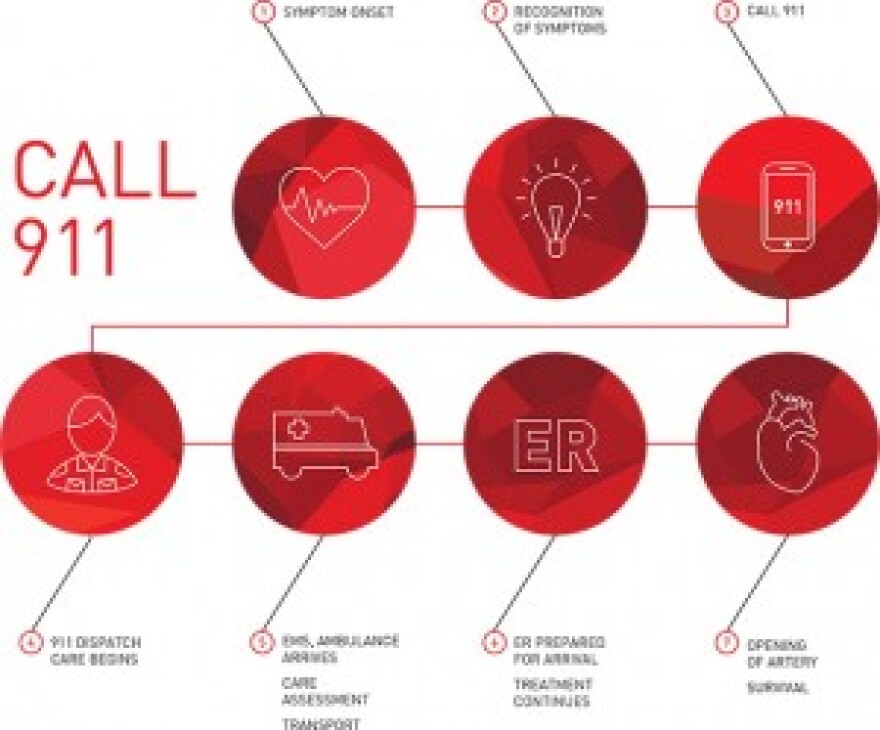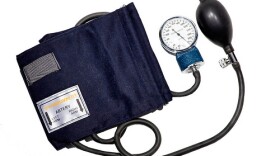Even though dozens of people in Dallas have heart attacks every day, most of them do not call 911. Instead, they wait, ignore the symptoms or drive themselves to the hospital.
That's why the American Heart Association has kicked off a campaign called “Don’t Die Of Doubt: Call 911”
Research shows there’s a simple trick that can decrease the time it takes to get surgery for a heart attack — dialing 911.
Just look at what happened with 70-year-old Ed Woyewodzic of Richardson.
In 2011, when Woyewodzic started feeling pain in his chest after eating a ham and cheese sandwich, his first though was not to call 911. Instead, he called his wife, Carla. Carla called 911.

“I was really hurting,” he says. “So I eventually ended up on the curb out front waiting for the fire truck to come.”
He didn’t wait long. Five minutes later the Richardson EMTs arrived, and from that moment paramedics began a highly-orchestrated series of procedures to save Woyewodzic’s life.
En route to Methodist Richardson Hospital, they did an echocardiogram, which revealed total blockage of an artery in the heart. The paramedics called the hospitals’ emergency department to prepare for surgery.
And just 18 minutes after passing through the hospital doors, a doctor opened Woyewodzic’s blocked artery.
This record-breaking treatment time was not a coincidence. It is part of a multi-million dollar grant from the W. W. Caruth, Jr. Foundation at Communities Foundation of Texas.
The first stage of the grant, from 2010 to 2012, focused on improving coordination among 15 Dallas-area hospitals and 24 Emergency Medical Services (EMS) agencies. The two-year effort resulted in more than a 30-minute reduction in the time between the arrival of EMS at the hospital and opening of the blocked artery.
Every Minute Counts
Chris Chaira, a paramedic and Firefighter in Dallas, says in the world of heart attacks, time is muscle
“Your heart is one giant muscle. The longer it goes without proper oxygenation the more damage it is going to sustain and that affects your outcome when you leave the hospital,” Chiara says.
Even though dozens of people in Dallas have heart attacks every day, most of them don’t call 911.
“Some people dismiss it,” he says. “And they wait. Some people try home remedies – apple cider vinegar and pickle juice.”
While working with the American Heart Association to streamline heart attack response protocols, Chiara learned another scary statistic.
“Forty percent of people having a heart attack were driving themselves to the hospital,” he says. “You don’t want to be sharing the highway with someone who’s having a heart attack. Things can get bad quick.”
Don’t Be Afraid To Dial, It Could Save Your Life
In the second part of the Caruth Grant, The American Heart Association is urging people to pick up the phone when they feel symptoms of a heart attack. The two-year public media campaign is called “Don’t Die Of Doubt.”
The message, which will be displayed on billboards and TV spots, could encourage people to take heart attack symptoms more seriously, says Dr. John Finnegan. Finnegan is Dean of the School of Public Health at the University of Minnesota.

“I think these campaigns have been fairly effective in getting people to respond faster to those symptoms rather than trying to pretend they don’t exist, or taking antacids or things like that,” he says.
In the 90s, Finnegan led a nationwide study looking at the effects of a public campaign encouraging people to call 911 as soon as they felt heart attack symptoms.
Like today’s “Don’t Die Of Doubt” campaign, Finnegan’s intervention focused on educating hospitals and health workers as well as the public.
“It’s one of those things where you always have to keep educating the next generation of the public,” Finnegan says.
Currently in North Texas, just forty percent of people call 911 for cardiac emergencies, which is below the national average of fifty percent.
Know The Signs
Symptoms of a heart attack can vary — and may differ between men and women. But the American Heart Association says most heart attacks start slowly, with mild pain or discomfort. Often people affected aren’t sure what’s wrong and wait too long before getting help.
Here are signs that can mean a heart attack is happening:
Chest Discomfort: Most heart attacks involve discomfort in the center of the chest that lasts more than a few minutes, or that goes away and comes back. It can feel like uncomfortable pressure, squeezing, fullness or pain.
Discomfort In Other Areas Of The Body: Symptoms can include pain or discomfort in one or both arms, the back, neck, jaw or stomach
Shortness Of Breath: With or without chest discomfort.
Breaking Out In A Cold Sweat, Nausea Or Lightheadedness
For more information, visit the Don’t Die of Doubt site.




